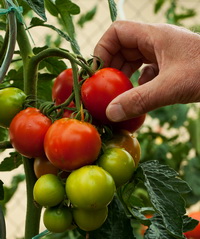
CRISPR-Cas9-Mediated Gene Replacement Generates Long-shelf Life Tomato Lines
October 25, 2017| |
 Breeders have long dreamed of developing genetically-enhanced breeding elites with value-adding performance as quickly as possible. With the present gene editing technologies, such as the CRISPR-Cas9 system, there is a reasonable expectation towards quickly achieving breeding goals.
Breeders have long dreamed of developing genetically-enhanced breeding elites with value-adding performance as quickly as possible. With the present gene editing technologies, such as the CRISPR-Cas9 system, there is a reasonable expectation towards quickly achieving breeding goals.
To evaluate the possible application of CRISPR-Cas9 on accelerating plant breeding, the team of Qing-hui Yu from Xinjiang Academy of Agricultural Science in China aimed to develop tomatoes with long shelf-life through gene replacement via homology directed repair (HDR) using CRISPR-Cas9.
The team aimed to replace the tomato ALC gene with a recessive alc gene. The average mutation frequency reached 72.73%. However, low replacement efficiency (7.69%) was achieved in T0 transgenic plants. No homozygous recessive mutations were detected in T0 plants. The heterozygous mutants stably transmitted the mutation to the T1 generation for segregation. The desired alc homozygous mutants were achieved in T1 generations.
This was further confirmed by characterization, highlighted by excellent storage performance. These results prove that CRISPR-Cas9-induced gene replacement via HDR could be a valuable method for breeding elite lines in tomato.
For more on this study, read the article in Scientific Reports.
| |
Biotech Updates is a weekly newsletter of ISAAA, a not-for-profit organization. It is distributed for free to over 22,000 subscribers worldwide to inform them about the key developments in biosciences, especially in biotechnology. Your support will help us in our mission to feed the world with knowledge. You can help by donating as little as $10.
-
See more articles:
-
News from Around the World
- Nigeria Prepares for Commercial Release of Bt Cowpea and Bt Cotton in 2018
- Disease Resistant Potato Field Tests Show Positive Results in Uganda
- U.S. Lawmakers Call for Consistency in Regulating Biotech
- International Research Team Releases New Version of Sunflower Genome
- Scientists Discover Path to Improved Barley Grain Quality
- EFSA Releases Risk Assessment of GM Maize GA21 for Renewal of Authorization
- Rice 'Supercharged' with Maize Gene May Help Boost Yields
-
Research Highlights
- Confined Expression of Bt Protein in Insect Wounding Parts of Potato Plants
- Host-Induced Gene Silencing of PsCPK1 in Pathogen Enhances Stripe Rust Resistance in Wheat
-
Beyond Crop Biotech
- Stevia Plant Genome Sequence Revealed for the First Time
- CAS Scientists Develop Low-Fat Pigs
-
Announcements
- BIO-Europe 2017
-
Resources
- Biotech Country Facts and Trends
-
Plant
- Application of CRISPR-CAs9 in Chrysanthemum Using Transgenes as Targets
- CRISPR-Cas9-Mediated Gene Replacement Generates Long-shelf Life Tomato Lines
-
Read the latest: - Biotech Updates (April 17, 2024)
- Gene Editing Supplement (April 10, 2024)
- Gene Drive Supplement (February 22, 2023)
-
Subscribe to BU: - Share
- Tweet
